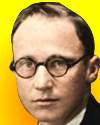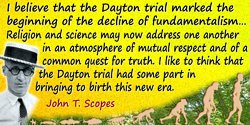 (source)
(source)
|
John T. Scopes
(3 Aug 1900 - 21 Oct 1970)
American teacher and geologist whose was the defendant in the infamous Scopes Monkey Trial (10 Jul 1925). The trial was to challenge the constitutionality of the Butler Act, a Tennessee law (signed 21 Mar 1925) to prohibit the teaching of evolution in the state’s schools.
|
Butler Act
Tennessee House Bill No. 185 (1925)
An Act prohibiting the teaching of the Evolution Theory
OF THE
STATE OF TENNESSEE
PASSED BY THE
SIXTY - FOURTH GENERAL ASSEMBLY
1925
CHAPTER NO. 27
House Bill No. 185
(By Mr. Butler)
AN ACT prohibiting the teaching of the Evolution Theory in all the Universities, Normals and all other public schools of Tennessee, which are supported in whole or in part by the public school funds of the State, and to provide penalties for the violations thereof.
Section 1. Be it enacted by the General Assembly of the State of Tennessee, That it shall be unlawful for any teacher in any of the Universities, Normals and all other public schools of the State which are supported in whole or in part by the public school funds of the State, to teach any theory that denies the story of the Divine Creation of man as taught in the Bible, and to teach instead that man has descended from a lower order of animals.
Section 2. Be it further enacted, That any teacher found guilty of the violation of this Act, Shall be guilty of a misdemeanor and upon conviction, shall be fined not less than One Hundred ($100.00) Dollars nor more than Five Hundred ($500.00) Dollars for each offense.
Section 3. Be it further enacted, That this Act take effect from and after its passage, the public welfare requiring it.
Passed March 13, 1925Speaker of the House of Representatives
L. D. Hill,
Speaker of the Senate
Governor.
- Science Quotes by John T. Scopes.
- 3 Aug - short biography, births, deaths and events on date of Scopes's birth.
- Butler Act Repeal - Tennessee House Bill No. 48 (1967)
- 17 May - short biography, births, deaths and events on date of repeal of the Butler Act.
- 21 Mar - short biography, births, deaths and events on date of enactment of the Butler Act.
- Center of the Storm: Memoirs of John T. Scopes, by John Scopes. - book suggestion.
- Booklist for Scopes Monkey Trial.






